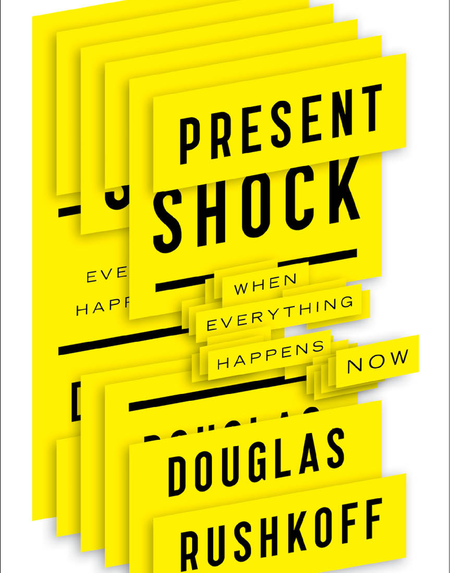By Christopher DeMarcus (The Cascade) – Email
Print Edition: November 27, 2013
What are you doing right now?
Instead of finding out Darth Vader is Luke Skywalker’s father in The Empire Strikes Back or that Ross loves Rachel on Friends, we are spending time playing with light-saber apps and stuck in a reality TV feedback loop. There is no conclusion, no catharsis, no moral lesson. There is only what’s happening right now.
It’s the narrative, the basic story arc we can relate to, that is starting to slide in modern media.
You’re reading an article in a newspaper—in print, online, or maybe out loud to someone else. This article, like most others, is built on a narrative structure: there is a beginning, middle, and end.
The problem for us and Rushkoff is that we are losing the ability to relate with the natural progression of the world. Being mindful and present is part of the human experience, but modern media has moved from a progressive narrative to a state of constant engagement, keeping our eyes glued to the screen.
While Present Shock does good to illuminate how we got caught in the constant media loop of modernity, it doesn’t do much to probe deep into the root cause and effects of our mass media society. There is no Lacanian-Žižek or Heideggerian-Arendt analysis of our obsession with the distractions of our modern technopoly. The book critiques mass media from a pop level, using pop culture examples to attack culture.
And that’s probably for the best, because this book is accessible in the best sense of the word. Its writing is tight and smooth. At a quick 300 pages, Present Shock makes for a fast, fun, and intellectual read. It may be only surfing the crest of media studies, but it catches some big waves. Rushkoff is able to quickly summarize media theorist Marshall McLuhan in a paragraph: the medium creates a space that shapes the message; “A lightbulb creates an environment, even though it has no content.”
Like Damian Thompson’s The Fix, this work explains how we get foolishly addicted to checking our email, even when there is little chance of there being something important to read. The solution to this problem is “stacking digital.” Meaning, we should go about our day doing important things—making product, communicating with co-workers, and eating without a screen in our face—then come to pile of e-mails when we’re ready. In this case, Rushkoff suggests using a auto-responder to return your e-mail requests until you’re ready to answer them.
Like most cultural critiques and media theorists that examine technology, Rushkoff doesn’t want to stop the onslaught of digital media, rather the goal is to understand it by examining how it affects our society. He looks at the trade-offs between innovation and tradition. For Rushkoff, the internet giveth and the internet taketh away. For as much openness as we have in our technology, transparency can be turned on its head and become an inverted totalitarian technocracy.
By the book’s end, every thinkable surface symbol of cultural is hit; from zombies as an analogy to mass media consumers to Beavis and Butt-Head as a generation of viewers who want television shows about people watching television shows. We are becoming less a society of consumers—people who pay for manufactured goods—and more a society of audience lumps—people who pay for media services to watch over dinnertime.
What this book teaches is how to separate the present from the distraction. As human beings—not machines—we can choose to live life by truly connecting, instead of always trying to catch up to what someone else did somewhere else. It’s about the positive effects of temporal flexibility and mindfulness: examining your own life and living well in it.



